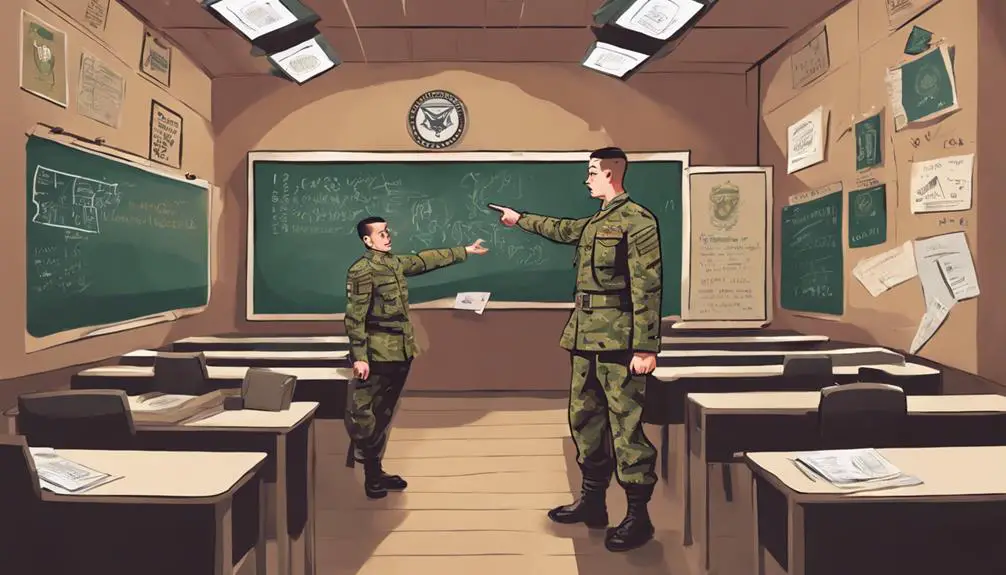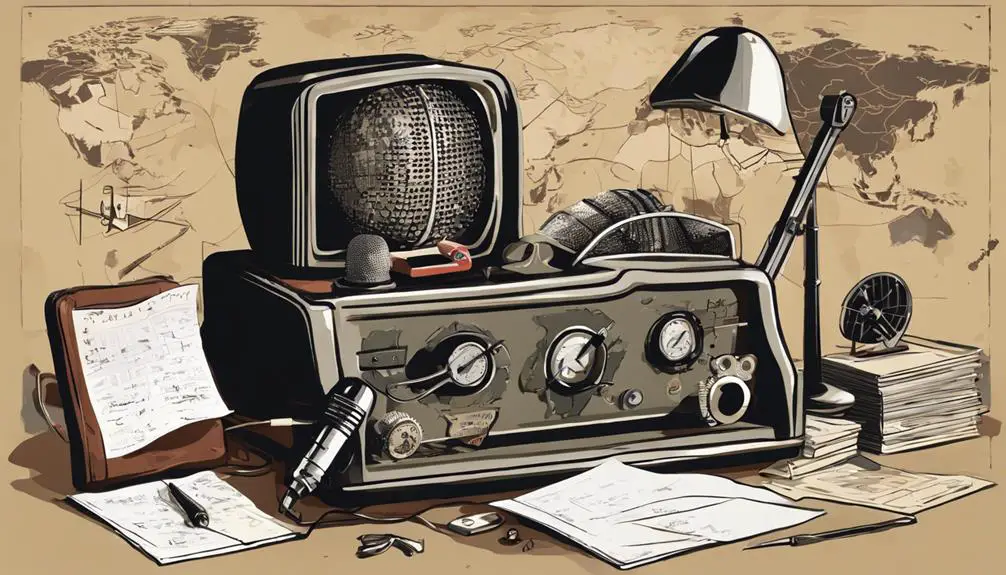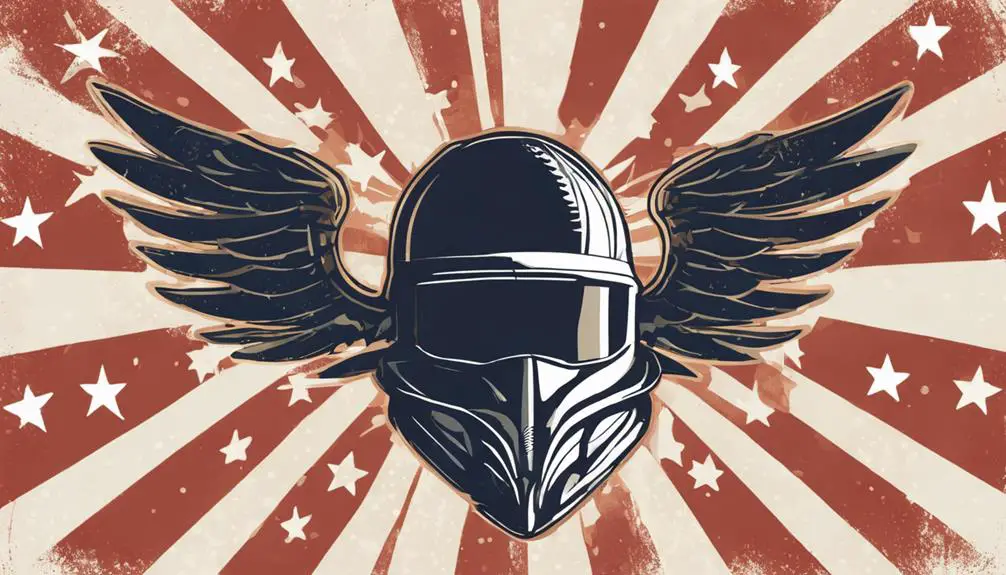You're about to explore the complex world of Ally military slang, where code names, colloquialisms, and specialized terms play an essential role in communication, camaraderie, and secrecy. From encrypted messages like 'Operation Overlord' to battlefield banter like 'Squad trash,' each phrase serves a purpose. You'll discover how rank-and-file lingo reflects the military's hierarchical structure, and how operations and maneuvers rely on specialized terminology. As you explore further, you'll uncover the significance of radio chatter, morale-boosting humor, and the intricate network of codes and ciphers that have shaped Ally military slang over time.
Code Names and Ciphers

During World War II, you'd often stumble upon cryptic messages and coded communications, as Allied forces relied heavily on code names and ciphers to maintain secrecy and outsmart the enemy. These encryption methods played an essential role in conveying vital information, from troop deployments to strategic operations. You'd encounter cryptic phrases like 'Operation Overlord' or 'Eclipse,' which referred to the D-Day invasion of Normandy and the subsequent Allied advance, respectively.
Cipher breakthroughs were equally important, as codebreakers worked tirelessly to decipher enemy communications. One notable example is the Enigma machine, a complex encryption device used by the Germans. British codebreaker Alan Turing's work on cracking the Enigma code significantly contributed to the Allied victory.
You'd also find that ciphers were used to conceal identities, with code names like 'Ultra' and 'Magic' referring to intelligence gathered from decrypted Axis communications. These encryption methods and cipher breakthroughs proved instrumental in shaping the war's outcome, demonstrating the importance of secure communication in military operations.
Battlefront Banter
On the battlefield, you'd frequently hear soldiers tossing around colloquialisms, acronyms, and slang terms that were as colorful as they were cryptic, serving as a unique language that bonded troops and baffled outsiders. This "battlefront banter" was a hallmark of military camaraderie, often manifesting as good-natured teasing or sarcastic remarks.
| Term | Meaning |
|---|---|
| Squad trash | Friendly insults exchanged among squad members |
| War wisecracks | Humorous remarks made during combat operations |
| Roger that | Affirmative response, indicating understanding |
| Oscar Mike | "On the move," indicating readiness to proceed |
In the heat of battle, such phrases helped maintain morale and fostered a sense of unity among troops. Squad trash, for instance, was a way to poke fun at each other, while war wisecracks allowed soldiers to momentarily forget the dangers surrounding them. By adopting this unique language, soldiers created a sense of belonging and reinforced their bonds on the battlefield.
Rank and File Lingo

In the military's hierarchical structure, you'll find a distinct vernacular that mirrors the organizational chart, with rank-and-file lingo serving as a verbal reflection of the chain of command.
As you navigate the military's social hierarchy, you'll encounter a unique lexicon that's specific to each echelon. Officers, for instance, have their own distinct dialect, often referred to as 'Officer speak.' This lingo is characterized by a more formal tone, with an emphasis on precision and clarity.
In contrast, enlisted personnel have their own colloquialisms, often rooted in camaraderie and shared experience. The 'buddy system,' for example, is a slang term that highlights the importance of teamwork and mutual support within the ranks. You'll also encounter terms like 'grunt' or 'troop,' which are used to describe frontline soldiers.
As you move up the ranks, you'll find that each branch and unit has its own unique linguistic nuances. Understanding these differences in rank-and-file lingo is essential for effective communication and cohesion within the military.
Operations and Maneuvers
You'll encounter a distinct subset of military slang when engaging in operations and maneuvers, where concise communication is crucial for successful mission execution. In this scenario, you'll hear terms that facilitate swift and accurate coordination between team members.
When participating in operations and maneuvers, you'll need to be familiar with slang related to tactical insertions, aerial reconnaissance, and other critical mission components. Here are three key terms to know:
- Tactical Insertions: Refers to the deployment of personnel or equipment into a specific area, often via helicopter or parachute.
- Aerial Reconnaissance: The gathering of information about an area or target using aerial assets, such as drones or aircraft.
- SITREP: Short for 'situation report,' this term is used to provide a brief update on the current mission status or situation.
Understanding these terms and others like them will enable you to communicate effectively with your team and guarantee successful mission execution. By mastering this specialized vocabulary, you'll become a more effective and valuable member of your unit.
Radio Chatter and Signals

When communicating over radio channels, clear and concise language is crucial to convey critical information quickly and accurately, as misinterpreted signals can have disastrous consequences. You must be precise and avoid ambiguity to guarantee that your message gets through clearly. In combat situations, every second counts, and a miscommunication can be fatal.
To minimize errors, you'll often use standardized phrases and protocols to convey complex information quickly. You'll also employ advanced technologies like Frequency Hopping to minimize interference and prevent Signal Jamming by enemy forces. This technique rapidly switches your transmission between different frequencies, making it harder for adversaries to intercept or disrupt your signal.
As you communicate over the radio, you'll need to be aware of your surroundings and adapt to changing situations. You'll use call signs and authentication protocols to verify the identity of the sender and make sure that sensitive information doesn't fall into the wrong hands. By following established protocols and using secure communication methods, you can guarantee that critical information reaches its intended recipient quickly and accurately.
Morale Boosters and Jokes
Military slang often incorporates morale-boosting expressions and humor to help alleviate stress, foster camaraderie, and maintain unit cohesion amidst the chaos of combat. You've probably heard phrases like 'Hooah' or 'Oorah' to express enthusiasm or approval. These expressions help create a sense of belonging and shared experience among troops.
Humor also plays a significant role in military slang. You might've heard of 'Canteen Comedy' or 'Mess Hall Mirth,' where soldiers share jokes and laughter to lift each other's spirits.
Here are a few examples:
- Slang expressions: 'FNG' (Freaking New Guy) or 'Cherries' for new recruits, implying they're still getting familiar with military life.
- Humorous nicknames: Soldiers often give each other nicknames based on their appearance, skills, or quirks, adding a touch of humor to their daily interactions.
- Witty one-liners: Phrases like 'Embrace the suck' or 'Hurry up and wait' poking fun at the military's notorious bureaucracy and inefficiencies.
These lighthearted moments help soldiers cope with the pressures of combat, fostering a sense of camaraderie and unity within the ranks.
Frequently Asked Questions
What Inspired the Creation of Military Slang During Wartime?
You wonder what sparked the creation of military slang during wartime. The answer lies in the warrior psyche, where humor serves as a coping mechanism for the stresses of combat.
Battlefield humor, in particular, becomes an essential tool for soldiers to process the trauma they've experienced.
As you explore further, you'll find that slang emerges as a way to express the unspeakable, to find levity in the darkest of times, and to forge bonds among comrades in the trenches.
How Does Military Slang Vary Across Different Branches?
You might assume that military slang is universal across all branches, but that's not the case. In reality, each branch has its own unique lingo.
You'll find that the Army has its own branch lingo, while the Navy has its service dialects. The Air Force, Marines, and Coast Guard also have their distinct slang.
For instance, the Army uses 'hooah' to express excitement, while the Navy uses 'anchors aweigh' to signal departure. These differences are a result of each branch's distinct culture and history.
Are Military Slang Terms Used by Other Countries' Militaries?
You might wonder if military slang is unique to the US. The answer is no. Other countries' militaries use their own slang terms.
For instance, the Australian military has its own distinct slang, with terms like 'fair dinkum' (genuine) and 'sheila' (a female soldier).
Similarly, the British military employs colloquialisms like 'squaddie' (soldier) and 'gobsmacked' (surprised).
These terms not only reflect local culture but also serve as a way to build camaraderie among troops.
Can Military Slang Be Used in Formal Military Communications?
As you consider the role of military slang, you're likely wondering if it has a place in formal military communications.
The answer is a resounding no. Formal language boundaries are essential in official military communications to maintain an official tone.
Using slang would compromise this tone, leading to potential miscommunication and confusion.
You must prioritize clarity and precision, ensuring that messages are conveyed accurately and efficiently.
Do Military Slang Terms Eventually Become Part of Mainstream Language?
As you ponder the fate of military slang, you might wonder: do colloquialisms born on the battlefield eventually seep into everyday conversation?
The answer lies in linguistic evolution and cultural assimilation.
As civilians interact with veterans, they adopt military slang, normalizing it in mainstream language. This process is gradual, but inevitable, as language constantly adapts to its surroundings.
You'll find that military slang terms, like 'boot camp' or 'Casualty Evacuation,' have already become an integral part of our everyday vocabulary.
Conclusion
As you explore the world of military slang, you start to decipher the secret language of the ally. It's like unraveling a cryptic message, where 'Oscar Mike' means 'on the move' and ' Bravo Zulu' signifies 'well done.'
This lingo is more than just a quirky quirk – it's a lifeline in high-stress situations. Take the story of a soldier who, during a chaotic firefight, received the radio call 'Say Again?' – a simple phrase that meant 'repeat your last transmission.' In that moment, clarity was life or death.







